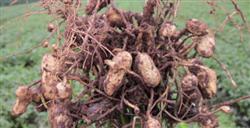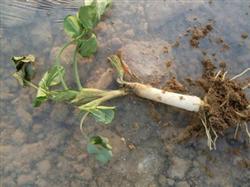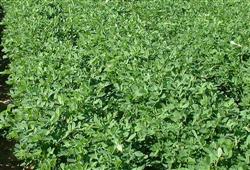What are the hazards of peanut continuous cropping?

What are the hazards of peanut continuous cropping? Please introduce the harm of peanut continuous cropping as follows: 1. It causes serious soil deficiency. Because the root of peanut has a large number of rhizobium, it is not very sensitive to nitrogen. Due to continuous cropping, the soil is lack of elements and can not meet the nutrients needed by peanuts, thus affecting the normal growth and development of peanuts. The longer the continuous cropping, the more serious the deficiency. On the other hand, there is generally no deficiency in the new stubble. 2. It causes serious harm to diseases and insect pests. Peanut bacterial wilt, virus disease, root nematode disease, leaf spot disease, etc., mostly due to the transmission of soil bacteria, the longer the continuous cropping time, the more diseased plants accumulated in the soil, the higher the probability of peanut post-infection. On the other hand, the peanut planted in the new stubble has a mild or no disease. 3. Affect their own absorption of nutrients. In the process of peanut growth and development, its roots continue to secrete more organic acids. Although these organic acids can dissolve minerals in the soil, continuous cropping will inevitably lead to excessive accumulation of organic acids in the soil, resulting in a very unfavorable soil environment for the development of peanut roots, affecting the ability of peanut roots to absorb nutrients, making the plants short and poor in disease resistance. 4. resulting in poor quality and low yield of peanuts. Peanut yield and quality are affected because of low fruit setting rate, low full fruit rate, small or even shrunken peanut kernels in continuous cropping. The experiment shows that the yield of peanut has been reduced by 8% to 10% for two years, by 25% to 30% for three years, and by more than 50% for more than four years. For this reason, peanuts should have high yield and improve quality, and farmers should practice crop rotation instead of continuous cropping. To create basic conditions for the normal growth of peanuts. Click to get more peanut planting technology click to get more grain and oil crop planting technology
- Prev

How to control peanut stem rot?
How to control peanut stem rot? Peanut stem rot commonly known as rotten neck disease, generally occurs in the middle and late stages, soon after the disease withered death, late for the infected. Fruit pods often rot or seeds are not satisfied, causing serious losses, the incidence of general fields is 20%~ 30%, serious cases reach 60%~ 70%, even no harvest....
- Next

What kind of micro-fertilizer can be applied to peanuts?
What kind of micro-fertilizer can be applied to peanuts? Please introduce that trace elements play an irreplaceable role in the growth and development of peanut (such as nitrogen, phosphorus, potassium, etc.). Scientific application of trace element fertilizer is an important measure for high quality and high yield of peanut. Iron fertilizer peanuts need to absorb 264 for every 1 ton of dry matter.
Related
- The first cup of black tea in spring, the flavor and history of tea gardens in Kenya, Africa
- The computer can not only choose potatoes, but also grow tea rice. AI will grow winter oolong tea champion.
- It is not only the inflated tea bitten by insects, but also engraved with the four seasons tea in Beipu.
- The Oriental Beauty Tea Festival in Zhuxian County takes the stage at the weekend to experience the plus-size feast of oil tea.
- & quot; Oriental Beauty Tea & Exploration of Emei in Hsinchu, the hometown of quot;
- The new variety of strawberry "Tainong 1" dessert is the first choice with mellow aroma. Crimson gorgeous
- History of Tea in Taiwan: from Wild Inner Mountain to Export Tea Garden
- Two types of Taiwan Oriental Beauty Black Tea won the British three-Star Award for Childhood Tea Xiang Zhang Jiaqi changed from pilot to champion tea maker.
- Banana species and varieties: the planting history of Taiwan Xianren banana and dwarf banana is long, is banana disease resistant?
- Coffee planting Technology: Qianjie Coffee from Seedling to harvesting

